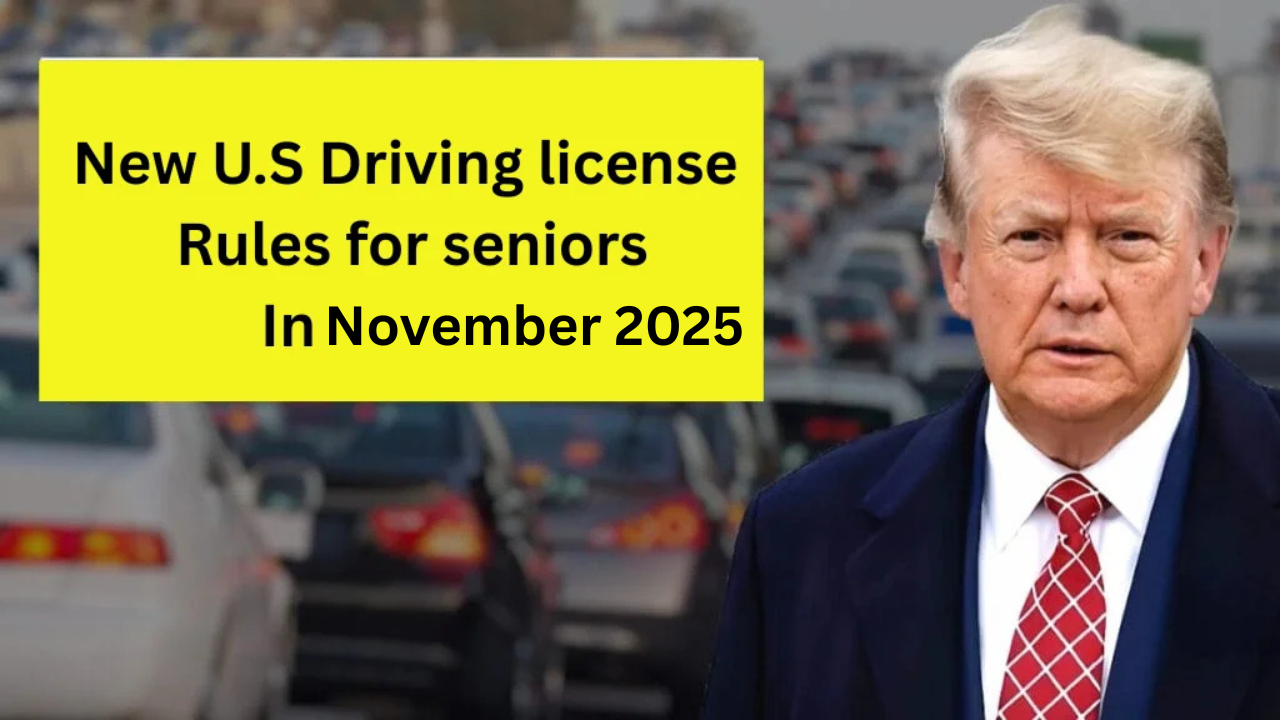New Driving License Rule:A major change is coming for millions of older Americans when it comes to driving. Starting in November 2025, new federal guidelines regarding driver’s license renewals and testing for senior citizens aged 70 and older will go into effect in many U.S. states. The goal? To make roads safer and ensure that older drivers can continue to enjoy their independence responsibly.
For many seniors, driving isn’t just about transportation—it’s about freedom, connection, and dignity. That’s why this new regulation has raised so many questions. What exactly is changing? Who will be affected by this change? And what do seniors need to do to comply with the rules? Here’s everything every driver over 70 needs to know before November 2025.
What’s Changing in November 2025
The U.S. Department of Transportation (DOT) and several state motor vehicle departments have agreed to adopt updated requirements for license renewal and testing for senior drivers. These changes primarily focus on vision, reaction time, and medical fitness evaluations during the license renewal process.
Previously, in most states, older adults could renew their licenses by mail or online, often for 8-10 years without an in-person test. Under the new rules, this will change. Starting in November 2025, seniors aged 70 and older will be required to renew their licenses in person and may have to complete the following:
- Vision screening by the DMV or a certified optometrist.
- A brief cognitive and reaction time assessment based on state guidelines.
- Medical clearance for certain conditions, such as epilepsy, severe diabetes, or cognitive impairment.
While the exact procedures will vary from state to state, the goal is to ensure that older drivers are fit to drive safely—not to arbitrarily take away anyone’s license.
Why is this change happening?
This update comes after a five-year federal review of driving safety data for senior drivers. According to the National Highway Traffic Safety Administration (NHTSA), drivers aged 70 and older have a slightly higher risk of being involved in fatal crashes, particularly at intersections and when making left turns.
However, experts emphasize that most senior drivers are cautious and responsible—the challenge lies in age-related health factors such as slower reaction times, vision changes, and medication side effects.
The new regulations aim to strike a balance between safety and independence. By implementing more frequent checkups, the DOT hopes to reduce preventable accidents while allowing capable seniors to remain mobile for as long as possible.
How Seniors Can Prepare Now
If you’re approaching age 70 — or already there — it’s a good idea to prepare early for the November 2025 changes. Here’s how:
-
Schedule a vision exam at least once a year. Keeping your prescription updated can make a major difference.
-
Review your medications with your doctor. Some prescriptions may cause drowsiness or slower response times that affect driving.
-
Stay mentally sharp by engaging in memory and coordination exercises.
-
Take a senior driving course — many insurance companies offer discounts for completing these safety refreshers.
-
Check your state DMV website regularly for specific rules, testing requirements, and renewal timelines.
Being proactive will ensure you’re ready when it’s time to renew your license under the new rules.
Will all states adopt this rule?
Although the DOT has issued recommendations for the entire country, implementation is up to each state. Some states, such as California, Florida, and Texas, have already announced updates in line with the new guidelines, while others are still reviewing their local adoption plans.
This means that even though the main federal guidance will go into effect in November 2025, testing intervals, grace periods, or exemptions may vary from state to state based on local laws. Senior citizens are advised to verify the details directly with their state’s Department of Motor Vehicles (DMV) to avoid any issues.
How Will This Affect License Renewals?
Under the new regulations, the renewal period for senior drivers may also be shortened. Instead of a 10-year renewal cycle, seniors may be required to renew their licenses every 4-5 years, ensuring regular health assessments.
The good news is that many DMVs are planning to offer priority scheduling or dedicated service hours for seniors to streamline this process. Some states will also accept optometrist-certified reports instead of on-site eye tests to save time.
Final Thoughts
Driving is a vital part of the independence of America’s senior citizens, and these changes are designed to protect that independence safely. The 2025 license renewal update isn’t about restricting older drivers; it’s about keeping everyone safe on the road, from families and commuters to pedestrians and seniors themselves.
By staying informed, getting regular health checkups, and preparing in advance, drivers over 70 can continue to enjoy the open road with confidence and safety.
As November 2025 approaches, the message is clear: age doesn’t determine your ability—preparation does.
FAQs
Q1. When do the new senior driving license rules start?
The new guidelines begin in November 2025, though some states may phase them in earlier.
Q2. Will all drivers over 70 lose their license automatically?
No. The rule focuses on ensuring medical and visual fitness, not revoking licenses.
Q3. Can I renew online after turning 70?
In most states, you’ll need to renew in person once you’re 70 or older.
Q4. Do I need a doctor’s note to renew my license?
Only if you have a medical condition that could affect safe driving, such as vision impairment or seizures.
Q5. Where can I find more information?
Visit your state DMV website or www.nhtsa.gov for official updates.

